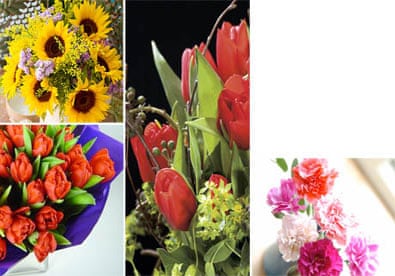
A rose on a black background
A classic Valentine's gift – but how green is the red rose? Photograph: Getty
Greening up the most traditional of Valentine's Day gifts is harder than you'd think, since most cut flowers are imported by plane at this time of year. Fortunately a number of specialist florists mean you can reduce the environmental impact of your blooms by buying locally-grown and Fairtrade options. I've rounded up five below.
Eco concerns
• The CO2 produced from transporting and growing flowers. British-grown flowers such as red tulips are theoretically the best way to reduce the CO2 emitted from growing your stems, but local doesn't always mean low carbon: one study suggested roses grown in Holland had a carbon footprint 15 times larger than those grown in Kenya. Waitrose has a handy calendar that shows which British flowers are in season now.
• Like food crops, flowers are often grown with pesticides. Several reports have raised concern over pesticides, from the World Health Organisation highlighting toxic chemicals used on Colombian flower farms to one study finding DDT in Mexican hothouses. Sadly, organic flowers are hard to come by in the UK – Waitrose is the only supermarket to sell them, but it doesn't stock any at this time of year.
• There's also the ethical issue of low pay for the workers who grow our imported flowers. For a guarantee that a fair wage is being paid, seek out the increasing number of Fairtrade bouquets.
Top 5 green choices
1. Wiggly Wigglers: British-grown seasonal bouquets from £25.
2. Arena Flowers – a selection of flowers, including these £33 gerberas, certified by the Fair Flowers Fair Plants scheme.
3. Scilly Flowers – seasonal bouquets from £25 and up, grown on the Isles of Scilly.
4. The Organic Flower Company – despite the name, TOFC doesn't stock organic blooms at this time of year, but it does have a ban on air-freighted flowers and is selling 50 red tulips for £40.
5. Waitrose – lots of Fairtrade flowers, including sunflowers for £20 and pricier mixed bouquets for £39 and up.
A Valentine Counterclockwise from top left: Waitrose has lots of Fairtrade flowers; tulips from The Organic Flower Company; seasonal flowers from Wiggly Wigglers; Scilly flowers. Photograph: PR

What sustainable stems do you recommend? Let's hear about your favourite ecoflorists and suppliers in the comments below.
